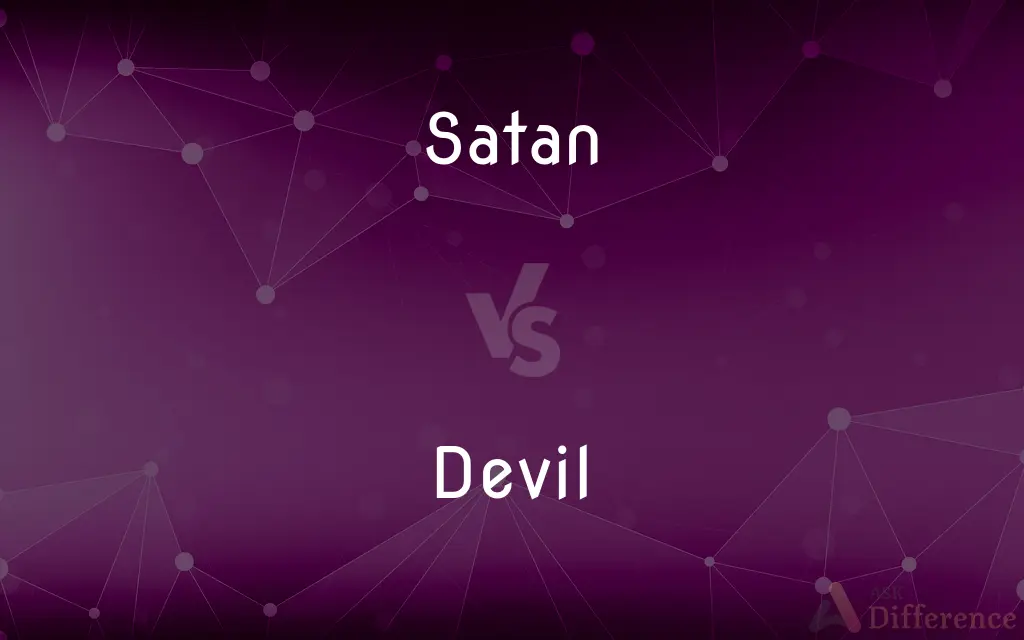Satan vs. Devil — What's the Difference?
By Tayyaba Rehman & Urooj Arif — Updated on April 27, 2024
Satan is traditionally seen as a specific rebellious angel in Judeo-Christian beliefs, considered a symbol of evil and temptation, while synonymous with Satan in many contexts, is a more general term for a supreme evil spirit across various cultures.

Difference Between Satan and Devil
Table of Contents
ADVERTISEMENT
Key Differences
Satan originates from the Abrahamic religions, particularly identified as a fallen angel who opposes God, embodying evil and temptation in Christian theology. On the other hand, the Devil is a broader term that can refer to any chief evil spirit in various religious and cultural folklore, not limited to Christian beliefs. Satan is often depicted as the tempter of humans, leading them away from divine law through deceit and manipulation. Whereas the Devil can appear in different forms and names across different cultures, often fulfilling a similar role as a personification of supreme evil.
While Satan specifically refers to a singular entity in scriptures, the concept of the Devil can include multiple demonic beings or evil spirits, especially in traditions outside of Christianity. This includes figures like Lucifer, Beelzebub, and others who may or may not be synonymous with Satan depending on the interpretation. In Christian art and literature, Satan is often portrayed as a cunning and persuasive figure, responsible for the original sin and the ongoing temptation of mankind. Conversely, depictions of the Devil vary widely, ranging from a red, horned creature to a more sophisticated deceiver, reflecting diverse cultural influences.
Satan’s role as an adversary is primarily theological, symbolizing the struggle between good and evil within the Christian faith. The Devil, however, transcends specific religious doctrines, appearing in various myths, folklore, and even pagan religions, often as a figure testing humanity or enforcing cosmic justice. Interpretations of Satan usually focus on his biblical narrative of fall from grace and subsequent role in human affairs. In contrast, the Devil’s portrayals can be more flexible, adapting to the needs of different moral and narrative structures across cultures.
Comparison Chart
Definition
A specific fallen angel opposing God in Christian theology.
A general term for a supreme evil spirit across various cultures.
Origin
Abrahamic religions, particularly Judaism and Christianity.
Various religious and cultural folklore.
ADVERTISEMENT
Role in Religion
Tempter of humans, embodiment of evil.
Personification of evil and moral adversary.
Depiction in Art
Often detailed and specific, reflecting biblical descriptions.
Diverse, influenced by cultural perceptions of evil.
Symbolism
Represents the eternal opposition to divine will.
Embodies the concept of ultimate evil and chaos.
Compare with Definitions
Satan
A fallen angel and the embodiment of opposition to God in Christian belief.
Satan’s role in the temptation of Eve is central to the story of Genesis.
Devil
A supreme evil spirit recognized in many cultures worldwide.
The Devil appears in various guises in folklore around the globe.
Satan
Symbolic of human rebellion against divine authority.
Milton’s Satan in Paradise Lost represents the ultimate rebel.
Devil
Often depicted as the ruler of hell and demonic realms.
The Devil presides over the underworld in numerous mythologies.
Satan
The personification of evil and temptation in biblical texts.
Satan testing Job’s faith is a well-known biblical narrative.
Devil
Represents the embodiment of evil and moral corruption.
The Devil is often used metaphorically to describe the worst traits of human behavior.
Satan
Associated specifically with Christian theology and eschatology.
Satan’s eventual defeat is prophesied in the Book of Revelation.
Devil
Symbolic of tests and trials for humans.
The Devil challenging Faust in the legendary tale reflects this role.
Satan
Often depicted as manipulating humans to commit sins.
Satan’s influence is cited in many tales of moral fall and redemption.
Devil
Appears in numerous religious and cultural narratives, adapting to local moral lessons.
The Devil features in cautionary tales to promote ethical behavior.
Satan
Satan, also known as the Devil, and sometimes also called Lucifer in Christianity, is a non-physical entity in the Abrahamic religions that seduces humans into sin or falsehood. In Judaism, Satan is seen as an agent subservient to God or typically regarded as a metaphor for the yetzer hara, or "evil inclination".
Devil
A devil is the personification of evil as it is conceived in various cultures and religious traditions. It is seen as the objectification of a hostile and destructive force.It is difficult to specify a particular definition of any complexity that will cover all of the traditions, beyond that it is a manifestation of evil.
Satan
In Abrahamic religions, a powerful spiritual being, the tempter and persecutor of humanity, sometimes considered as an angel who rebelled against God and became the Devil.
Devil
Often Devil In many religions, the major personified spirit of evil, ruler of Hell, and foe of God. Used with the.
Satan
Alternative form of Satan.
Devil
A subordinate evil spirit; a demon.
Satan
The grand adversary of man; the Devil, or Prince of darkness; the chief of the fallen angels; the archfiend.
I beheld Satan as lightning fall from heaven.
Devil
A wicked or malevolent person.
Satan
(Judeo-Christian and Islamic religions) chief spirit of evil and adversary of God; tempter of mankind; master of Hell
Devil
A person
A handsome devil.
The poor devil.
Devil
An energetic, mischievous, daring, or clever person.
Devil
(Printing) A printer's devil.
Devil
A device or machine, especially one having teeth or spikes and used for tearing.
Devil
An outstanding example, especially of something difficult or bad
Has a devil of a temper.
Devil
A severe reprimand or expression of anger
Gave me the devil for cutting class.
Devil
(Informal) Used as an intensive
Who the devil do you think you are?.
Devil
To season (food) heavily.
Devil
To annoy, torment, or harass.
Devil
To tear up (cloth or rags) in a toothed machine.
Devil
(theology) The chief devil; Satan.
Devil
(theology) An evil creature, the objectification of a hostile and destructive force.
Devil
(folklore) A fictional image of a man, usually red or orange in skin color; with a set of horns on his head, a pointed goatee and a long tail and carrying a pitchfork; that represents evil and portrayed to children in an effort to discourage bad behavior.
Devil
The bad part of the conscience; the opposite to the angel.
The devil in me wants to let him suffer.
Devil
A wicked or naughty person, or one who harbors reckless, spirited energy, especially in a mischievous way; usually said of a young child.
Those two kids are devils in a toy store.
Devil
A thing that is awkward or difficult to understand or do.
That math problem was a devil.
Devil
Hell.
What in the devil is that?
What the devil is that?
She is having a devil of a time fixing it.
You can go to the devil for all I care.
Devil
A person, especially a man; used to express a particular opinion of him, usually in the phrases poor devil and lucky devil.
Devil
A printer's assistant.
Devil
(India) A poltergeist that haunts printing works.
Devil
A dust devil.
Devil
A barren, unproductive and unused area.
Devil strip
Devil
(cookery) A dish, as a bone with the meat, broiled and excessively peppered; a grill with Cayenne pepper.
Devil
A machine for tearing or cutting rags, cotton, etc.
Devil
A Tasmanian devil.
Devil
An endurance event where riders who fall behind are periodically eliminated.
Devil
(nautical) devil seam: {{ngd}}
Devil
To make like a devil; to invest with the character of a devil.
Devil
To annoy or bother.
Devil
To work as a ‘devil’; to work for a lawyer or writer without fee or recognition.
Devil
To prepare (food) with spices, making it spicy:
Devil
To grill with cayenne pepper; to season highly in cooking, as with pepper.
Devil
To finely grind cooked ham or other meat with spices and condiments.
Devil
To prepare a sidedish of shelled halved boiled eggs to whose extracted yolks are added condiments and spices, which mixture then is placed into the halved whites to be served.
She's going to devil four dozen eggs for the picnic.
Devil
The Evil One; Satan, represented as the tempter and spiritual of mankind.
[Jesus] being forty days tempted of the devil.
That old serpent, called the Devil, and Satan, which deceiveth the whole world.
Devil
An evil spirit; a demon.
A dumb man possessed with a devil.
Devil
A very wicked person; hence, any great evil.
Have not I chosen you twelve, and one of you is a devil?
Devil
An expletive of surprise, vexation, or emphasis, or, ironically, of negation.
The devil a puritan that he is, . . . but a timepleaser.
The things, we know, are neither rich nor rare,But wonder how the devil they got there.
Devil
A dish, as a bone with the meat, broiled and excessively peppered; a grill with Cayenne pepper.
Men and women busy in baking, broiling, roasting oysters, and preparing devils on the gridiron.
Devil
A machine for tearing or cutting rags, cotton, etc.
Devil
To make like a devil; to invest with the character of a devil.
Devil
To grill with Cayenne pepper; to season highly in cooking, as with pepper.
A deviled leg of turkey.
Devil
(Judeo-Christian and Islamic religions) chief spirit of evil and adversary of God; tempter of mankind; master of Hell
Devil
One of the evil spirits of traditional Jewish and Christian belief
Devil
A word used in exclamations of confusion;
What the devil
The deuce with it
The dickens you say
Devil
A rowdy or mischievous person (usually a young man);
He chased the young hellions out of his yard
Devil
A cruel wicked and inhuman person
Devil
Cause annoyance in; disturb, especially by minor irritations;
Mosquitoes buzzing in my ear really bothers me
It irritates me that she never closes the door after she leaves
Devil
Coat or stuff with a spicy paste;
Devilled eggs
Common Curiosities
Can Satan and the Devil be considered the same?
In many Christian contexts, they are synonymous, but the Devil also appears in other cultural and religious narratives independently of Satan.
What is the main difference between Satan and the Devil?
Satan is specifically a fallen angel in Christian theology, while the Devil is a broader term for any supreme evil spirit across various cultures.
Why is Satan often depicted as tempting humans?
In Christian theology, Satan’s role as the tempter relates to his purpose to oppose God’s will and lead humans astray.
Is the Devil always portrayed as malevolent in all cultures?
Not necessarily; in some traditions, the Devil may serve as a tester or challenger of faith rather than purely a malevolent figure.
What are some other names for Satan and the Devil?
Satan is also referred to as Lucifer, Beelzebub, and the Prince of Darkness, while the Devil is sometimes called Mephistopheles, Old Nick, or simply Satan in various contexts.
How do modern interpretations of Satan and the Devil differ from historical ones?
Modern interpretations often emphasize the symbolic aspects of these figures, representing inner human conflicts and moral dilemmas, whereas historical views might have taken their existence more literally as supernatural beings.
Are there any positive aspects attributed to Satan or the Devil in any cultures?
In some interpretations, such as certain strands of modern Satanism, Satan is viewed as a symbol of freedom and individualism, rather than outright evil.
Can Satan and the Devil be reconciled with a benevolent universe in theological discussions?
This is a complex theological debate; some argue that they serve as necessary agents for free will and the choice between good and evil, while others see their existence as contradictory to a wholly good deity.
How do Satan and the Devil influence literature and art?
Both figures are prevalent in literature and art, often symbolizing the ultimate antagonists and influencing themes of temptation, evil, and redemption across diverse genres.
How do different Christian denominations view Satan and the Devil?
Views vary significantly; for example, some more conservative denominations take a very literal approach to Satan as an actual being, while more liberal branches may interpret him metaphorically.
Do all religions believe in a figure like Satan or the Devil?
Many religions have concepts of evil personified, but not all use the figures of Satan or the Devil specifically. For instance, Buddhism and Hinduism have different interpretations of evil forces.
What impact have Satan and the Devil had on popular culture?
These figures are iconic in popular culture, appearing in countless movies, TV shows, books, and songs, typically embodying the essence of rebellion or evil.
What psychological role do Satan and the Devil play in society?
They often function as manifestations of the evil within or the external evil that society must confront, serving as tools for explaining moral and ethical struggles.
What role does the Devil play in other religious texts outside Christianity?
In Islam, for example, the Devil (known as Iblis) refused to bow to Adam and was cast out of heaven, playing a role similar to the tempter and opposer of mankind's virtue, similar yet distinct from Christian interpretations.
Share Your Discovery

Previous Comparison
Drey vs. Dray
Next Comparison
Close vs. SealAuthor Spotlight
Written by
Tayyaba RehmanTayyaba Rehman is a distinguished writer, currently serving as a primary contributor to askdifference.com. As a researcher in semantics and etymology, Tayyaba's passion for the complexity of languages and their distinctions has found a perfect home on the platform. Tayyaba delves into the intricacies of language, distinguishing between commonly confused words and phrases, thereby providing clarity for readers worldwide.
Co-written by
Urooj ArifUrooj is a skilled content writer at Ask Difference, known for her exceptional ability to simplify complex topics into engaging and informative content. With a passion for research and a flair for clear, concise writing, she consistently delivers articles that resonate with our diverse audience.














































